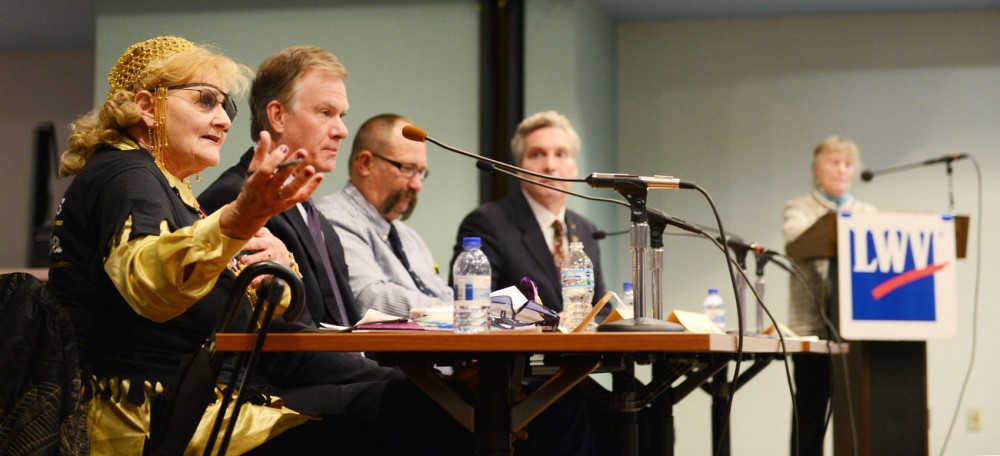Three challengers each hope to unseat two-term incumbent Chris Coleman to become the new mayor of St. Paul.
But with few political resources and little name recognition, Sharon Anderson, Tim Holden and Kurt Dornfeld don’t pose much of a challenge to Coleman.
“In general, I would say it’s probably not a race,” said David Schultz, a Hamline University law professor.
Schultz said although Coleman is “vulnerable” on some policy issues, this year’s challengers lack the resources and platforms to seriously challenge him.
For Coleman to have any serious opposition, Schultz said, the DFL would have to produce a candidate who has backing from small businesses and neighborhood advocates — two policy areas in which Schultz said Coleman has been weak.
The four candidates met Thursday night for a lively mayoral forum where they discussed issues of diversity, economic development and education to an audience of about 100.
At the forum, hosted by the League of Women Voters, Coleman pointed to multiple accomplishments he’s made since becoming mayor in 2005, including spearheading the Central Corridor light rail project and managing the city’s budget during tough economic times.
“I think over the past eight years we’ve accomplished a lot together,” he said.
Schultz said many of Coleman’s accomplishments are a result of being “in the right place at the right time.”
Holden, Coleman’s most active challenger, accused the mayor of not being accessible and responsive to citizens.
Coleman’s office didn’t properly respond to businesses struggling because of light rail construction, said Holden, a real estate agent and owner of a small contracting business on University Avenue.
Coleman admitted that construction has been tough on small businesses, but he said it will benefit the city by bringing new businesses and more housing.
“It’s been a difficult process,” he said. “But we set out to minimize the impacts of that.”
Schultz said Holden has “good criticisms” of Coleman’s business policies but lacks a “viable set of policies and proposals” to address those issues.
Holden also disagreed with Coleman’s public spending strategy, especially on the $63 million St. Paul Saints downtown ballpark project.
“The people were never given a vote,” Holden said. “This was the mayor’s pet project.”
Dornfeld, a city street maintenance worker who’s running for political office for the first time, said if elected, he would offer a “perspective that best represents all of the people of St. Paul.”
He said his priorities as mayor are unclear, but he’d give the position “a fresh set of eyes.”
Anderson, who has been running for public office for decades, spoke candidly at the forum, often ducking questions and accusing the city of “stealing” her car and her Summit Avenue home.
Dressed as a pirate at the forum, Anderson compared St. Paul and Minneapolis to Sodom and Gomorrah and likened the Central Corridor light rail to Nazi trains that took victims to the Auschwitz concentration camp during the Holocaust.
As of the Oct. 22 campaign finance filing deadline, Coleman had received more than $150,000 in campaign contributions. His closest challenger, Holden, had received $2,250 in contributions, but he loaned his campaign thousands more.
In Minneapolis, 35 mayoral candidates are looking to replace outgoing Mayor R.T. Rybak, who isn’t seeking a fourth term.
Like Minneapolis voters, St. Paul voters will use the ranked-choice voting method, where voters will be able to list their top three choices for mayor on the Nov. 5 ballot.
Schultz said unlike St. Paul, Minneapolis has a “weak mayoral system” and a “more fragmented” DFL party, which he said produces more competition for mayor.
“St. Paul has a really strong mayor position combined with a unified, single party, [giving] Chris Coleman an incredible platform for running for his third term,” he said.
Iris Page, a University of Minnesota studio art sophomore from St. Paul, said she’s more familiar with the Minneapolis mayoral race because she’s seen campaign material from multiple candidates.
However, she said, she hasn’t seen many Coleman campaign ads in the few times she’s been back to St. Paul this year.
“I have not been very aware of what’s going on [in St. Paul] because I haven’t heard or seen anything about the candidates,” Page said.
History junior Carson O’Doubhlain, who lives in St. Paul and commutes to the Minneapolis campus every day, said she’s seen campaign signs for Holden around the Midway area in St. Paul but thinks most people are only aware of Coleman.
“Chris Coleman has been around for a really long time,” she said. “People trust him.”
O’Doubhlain said that she and most people she knows from St. Paul will vote for Coleman on Nov. 5.
“He hasn’t really given us a reason not to,” she said.







